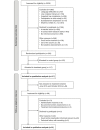Treatment Activity, User Satisfaction, and Experienced Usability of Internet-Based Cognitive Behavioral Therapy for Adults With Depression and Anxiety After a Myocardial Infarction: Mixed-Methods Study
- PMID: 29549067
- PMCID: PMC5878371
- DOI: 10.2196/jmir.9690
Treatment Activity, User Satisfaction, and Experienced Usability of Internet-Based Cognitive Behavioral Therapy for Adults With Depression and Anxiety After a Myocardial Infarction: Mixed-Methods Study
Abstract
Background: Knowledge about user experiences may lead to insights about how to improve treatment activity in Internet-based cognitive behavioral therapy (iCBT) to reduce symptoms of depression and anxiety among people with a somatic disease. There is a need for studies conducted alongside randomized trials, to explore treatment activity and user experiences related to such interventions, especially among people with older age who are recruited in routine care.
Objective: The aim of the study was to explore treatment activity, user satisfaction, and usability experiences among patients allocated to treatment in the U-CARE Heart study, a randomized clinical trial of an iCBT intervention for treatment of depression and anxiety following a recent myocardial infarction.
Methods: This was a mixed methods study where quantitative and qualitative approaches were used. Patients were recruited consecutively from 25 cardiac clinics in Sweden. The study included 117 patients allocated to 14 weeks of an iCBT intervention in the U-CARE Heart study. Quantitative data about treatment activity and therapist communication were collected through logged user patterns, which were analyzed with descriptive statistics. Qualitative data with regard to positive and negative experiences, and suggestions for improvements concerning the intervention, were collected through semistructured interviews with 21 patients in the treatment arm after follow-up. The interviews were analyzed with qualitative manifest content analysis.
Results: Treatment activity was low with regard to number of completed modules (mean 0.76, SD 0.93, range 0-5) and completed assignments (mean 3.09, SD 4.05, range 0-29). Most of the participants initiated the introduction module (113/117, 96.6%), and about half (63/117, 53.9%) of all participants completed the introductory module, but only 18 (15.4%, 18/117) continued to work with any of the remaining 10 modules, and each of the remaining modules was completed by 7 or less of the participants. On average, patients sent less than 2 internal messages to their therapist during the intervention (mean 1.42, SD 2.56, range 0-16). Interviews revealed different preferences with regard to the internet-based portal, the content of the treatment program, and the therapist communication. Aspects related to the personal situation and required skills included unpleasant emotions evoked by the intervention, lack of time, and technical difficulties.
Conclusions: Patients with a recent myocardial infarction and symptoms of depression and anxiety showed low treatment activity in this guided iCBT intervention with regard to completed modules, completed assignments, and internal messages sent to their therapist. The findings call attention to the need for researchers to carefully consider the preferences, personal situation, and technical skills of the end users during the development of these interventions. The study indicates several challenges that need to be addressed to improve treatment activity, user satisfaction, and usability in internet-based interventions in this population.
Keywords: adherence; attrition; cognitive behavioral therapy; computer-assisted therapy; internet; mental health; myocardial infarction.
©Emma Wallin, Fredrika Norlund, Erik Martin Gustaf Olsson, Gunilla Burell, Claes Held, Tommy Carlsson. Originally published in the Journal of Medical Internet Research (http://www.jmir.org), 16.03.2018.
Conflict of interest statement
Conflicts of Interest: None declared.
Figures



References
-
- Thombs BD, Bass EB, Ford DE, Stewart KJ, Tsilidis KK, Patel U, Fauerbach JA, Bush DE, Ziegelstein RC. Prevalence of depression in survivors of acute myocardial infarction. J Gen Intern Med. 2006 Jan;21(1):30–8. doi: 10.1111/j.1525-1497.2005.00269.x. https://onlinelibrary.wiley.com/resolve/openurl?genre=article&sid=nlm:pu... - DOI - PMC - PubMed
-
- Meijer A, Conradi HJ, Bos EH, Thombs BD, van Melle JP, de Jonge P. Prognostic association of depression following myocardial infarction with mortality and cardiovascular events: a meta-analysis of 25 years of research. Gen Hosp Psychiatry. 2011;33(3):203–16. doi: 10.1016/j.genhosppsych.2011.02.007. https://linkinghub.elsevier.com/retrieve/pii/S0163-8343(11)00064-8 - DOI - PubMed
-
- DiMatteo MR, Lepper HS, Croghan TW. Depression is a risk factor for noncompliance with medical treatment: meta-analysis of the effects of anxiety and depression on patient adherence. Arch Intern Med. 2000 Jul 24;160(14):2101–7. - PubMed
Publication types
MeSH terms
LinkOut - more resources
Full Text Sources
Other Literature Sources
Medical
Miscellaneous

